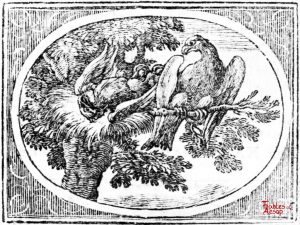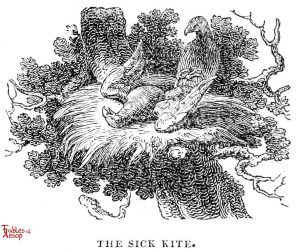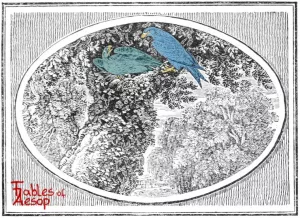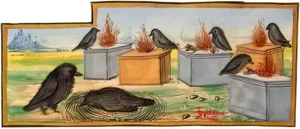A sick kite begged his mother to visit altars and pray for his recovery. The mother said no as they had robbed all the altars she might pray at.
We must make friends in prosperity if we would have their help in adversity.

Townsend version
A kite, sick unto death, said to his mother: “O Mother! do not mourn, but at once invoke the gods that my life may be prolonged.” She replied, “Alas! my son, which of the gods do you think will pity you? Is there one whom you have not outraged by filching from their very altars a part of the sacrifice offered up to them?’
Moral
We must make friends in prosperity if we would have their help in adversity.

Samuel Croxall
A KITE had been sick a long time; and finding there were no hopes of recovery, hedged of his mother to go to all the churches and religious houses in the country, to try what prayers and promises would effect in his behalf. The old Kite replied, Indeed dear son, I would willingly undertake any thing to save your life, but I have great reason to despair of doing you any service in the way you propose: for, with what face can I ask any thing of the Gods in favour of one, whose whole life has been a continual scene of rapine and injustice, and who has not scrupled, upon occasion, to rob the very altars themselves?
THE APPLICATION
The rehearsal of this fable almost unavoidably draws our attention to that very serious and important point, the consideration of a death-bed repentance. And, to expose the absurdity of relying upon such a weak foundation, we need only ask the same question with the Kite in the fable: how can he that has offended the Gods all his life-time, by doing acts of dishonour and injustice, expect that they should be pleased with him at last, for no other reason but because he fears he shall not be able to offend them any longer; when, in truth, such a repentance can signify nothing but a confirmation of his former impudence and folly: for sure no stupidity can exceed that of the man who expects future judgment, and yet can bear to commit any piece of injustice, with a sense and deliberation of the fact.”

Thomas Bewick (The Sick Kite)
A Kite who had been sick a long time, beginning to be doubtful of recovery, begged of his Mother to go to all the churches and religious houses in the country, to try what prayers and offerings would effect in his behalf. The old Kite replied, Indeed, my dear son, I would willingly undertake any thing to save your life; but I have great reason to despair of doing you any service in the way you propose: for, with what face can I ask any thing of the Gods, in favour of one whose whole life has been a continued scene of rapine and injustice, and who has not scrupled, upon occasion, to rob even their altars?
APPLICATION.
The rehearsal of this Fable almost unavoidably draws our attention to that very serious and important point, the consideration of a death-bed repentance, the sincerity of which we may justly suspect in one whose whole life has been spent in acts of wickedness and impiety. To expose the absurdity of relying upon such a weak foundation, we need only ask the same question with the Kite in the Fable: how can he, who has offended the Gods all his life-time by acts of dishonour and injustice, expect that they will be pleased with him at last, for no other reason but because he fears he shall not be able to offend them any longer? Since the summons to “pass that bourn whence no traveller returns,” must one day come, we ought always to be prepared to meet it. But when the whole life has been wasted, without communion with, or totally estranged from that Almighty Being, by whose fiat it was called into existence, then indeed the polluted soul must be distracted with the agonizing thoughts of appearing before Him, who created it for a very different purpose. Nothing but the consciousness of having led a virtuous life, can in the awful moment, disarm death of his terrors, and fortify the mind with cheering hopes and resignation. But this is a subject of the utmost importance, and the due enforcing of it is one of the most solemn duties of the pulpit.
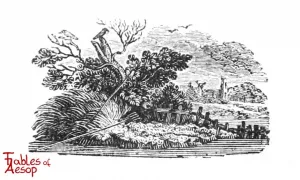

JBR Collection
A Kite who had been ill for a long time, begged of his mother to go to all the temples in the country, and see what prayers and promises could do for his recovery. The old Kite replied, “My son, unless you can think of an altar that neither of us has robbed, I fear that nothing can be done for you in that way. “

L’Estrange version (A Sick Kite and Her Mother)
Pray mother (says a sick kite) give over these idle lamentations, and let me rather have your prayers. Alas! my child, (says the dam) which of the gods shall I go to, for a wretch that has robb’d all their altars?
Moral
Nothing but the conscience of a virtuous life can make death easie to us, wherefore there’s no trusting to the distraction of an agonizing, and a death-bed repentance.

Gherardo Image from 1480

Milvus Aegrotans
Aegrotavit aliquando milvus periculose, remedia nil effecerant; accersiti frustra medici monent disponat rebus suis. Is tandem moriturus matrem vocat, rogat, quando in medicis humanis spes nulla salutis esset, eat precatum Deos pro sua valetudine. Respondet illa incunctanter, “Nil tibi, fili, ex illa parte sperandum puta; nec quicquam tuo nomine, aut causa, Diis supplicandum, quorum sacra et aras tuis toties rapinis violasti.”
Perry #324
